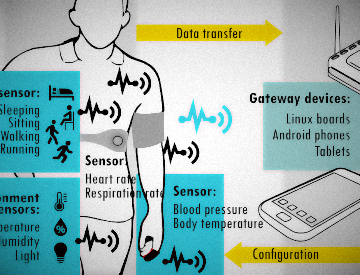PROJECTS
Internet of Cognitive Things for Personalized Healthcare
Quality of Experience (QoE) is a key metric for the successful delivery of end-user services for IoT-enabled applications. Achieving consistent end-user QoE poses tremendous challenges in the face of resource constraints and dynamic variations at multiple scales of the IoT system stack: at the application, network, resource, and device levels. This proposal outlines a self-aware cognitive architecture – the Internet of Cognitive Things (IoCT) – that delivers acceptable QoE by adapting to dynamic variations in infrastructural compute, communication and resource needs, while also synergistically learning and adapting to end user behavior. The approach leverages edge (i.e., Fog) computing architectures to introduce intelligence and adaptability in integrated multi-scale IoT systems. The objective is to efficiently manage information acquisition, communication and processing across different scales of the IoT systems, while synergistically coupling learning of end-user behaviors to deliver efficient and customized services. The proposed IoCT system is the first example of architecture where a network of algorithms communicates and collaborates synergistically to achieve a system-wide objective. Cognition and edge computing architectures are leveraged to introduce intelligence and adaptability in integrated multi-scale IoT systems, through a Personal Holistic Cognitive Optimization (PHCO) framework. To this aim, the IoCT will adopt recently proposed learning and control techniques (i.e. Deep Q-Networks), and exploit self-awareness principles to achieve effective system optimization. The project leverages on-going collaboration with the Turku University Hospital to demonstrate a personalized ubiquitous healthcare framework using the Early Warning Score (EWS) system for human health monitoring. Healthcare spending accounts for almost 17% of the GDP in the US. In healthcare, effective monitoring and observation of patients plays a key role in detecting a deteriorating patient. This project’s exemplar application on efficient early detection of these life-threatening signs can potentially save lives through better quality of care, and timely delivery of critical/urgent health indicators. The framework and services are also applicable to a broad range of other IoT application domains.
A joint project between the Academy of Finland and National Science Foundation (NSF), US.

